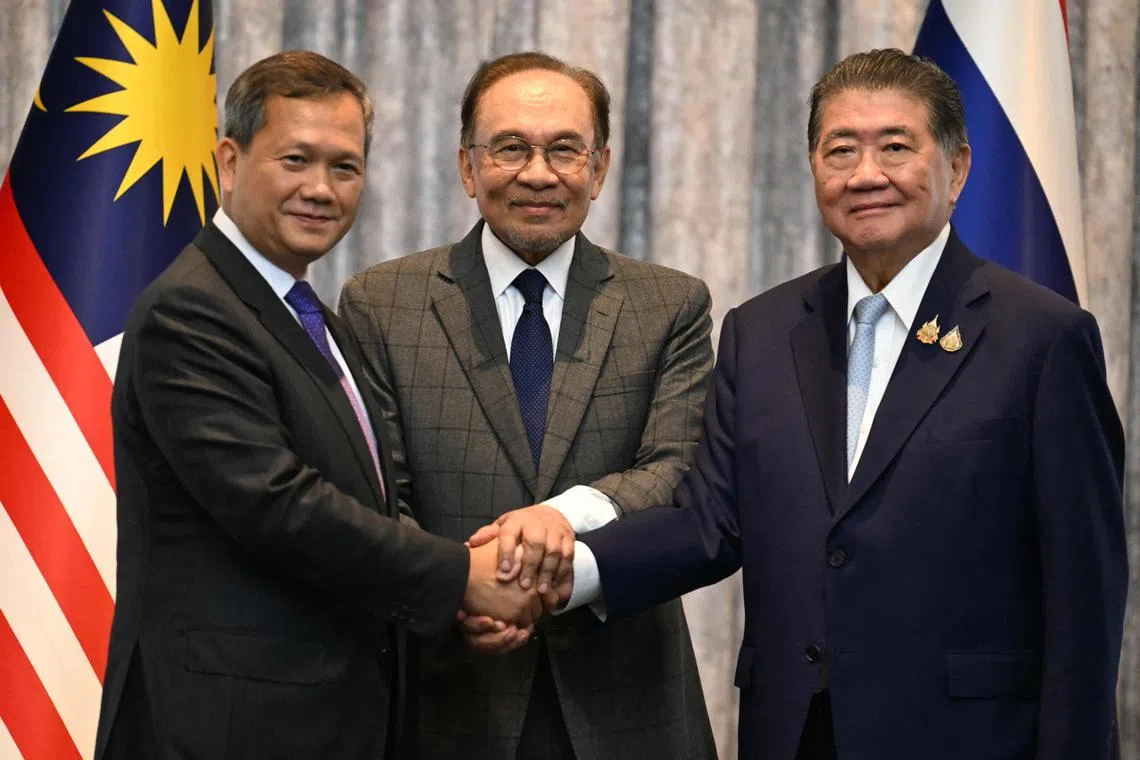Cambodia, Thailand agree to ‘immediate and unconditional ceasefire’ to de-escalate border row
Sign up now: Get insights on Asia's fast-moving developments

(From left) Cambodian Prime Minister Hun Manet, Malaysian Prime Minister Anwar Ibrahim and Thai Acting Prime Minister Phumtham Wechayachai in Malaysia’s administrative capital Putrajaya on July 28.
PHOTO: AFP
Follow topic:
KUALA LUMPUR – The leaders of Cambodia and Thailand agreed on July 28 to an “immediate and unconditional ceasefire” after five days of combat along their jungle-clad frontier that has killed at least 36 people.
Hundreds of thousands of people have fled as the two sides fired artillery, rockets and guns
The flare-up was the deadliest since violence raged sporadically from 2008 to 2011 over the territory, claimed by both sides because of a vague demarcation made by Cambodia’s French colonial administrators in 1907.
Reading a joint statement from the leaders of both countries and Malaysia after the peace talks, Malaysian Prime Minister Anwar Ibrahim said the ceasefire would take effect on July 29.
“This is a vital first step towards de-escalation and the restoration of peace and security,” Datuk Seri Anwar said at a press conference in Malaysia’s administrative capital Putrajaya, flanked by Cambodian Prime Minister Hun Manet and Thai Acting Prime Minister Phumtham Wechayachai.
He said a meeting of military commanders from both sides would take place early on July 29, before the countries’ cross-border committee meets in Cambodia on Aug 4.
Mr Anwar, who mediated the talks as Asean chair, said Malaysia and other members of Asean are ready to help monitor the ceasefire.
Both sides will need to agree to pull their armies, which have now been greatly reinforced, back from the border, and to accept some kind of independent monitoring to prevent further clashes, he said.
As the deal was being announced, an AFP journalist in the Cambodian city of Samraong – 17km from the fraught frontier – reported hearing continuing artillery blasts.
But locals expressed relief that a truce has been struck.
“I am very happy with the ceasefire. This will let people go back home and children go back to school,” 48-year-old Cambodian vendor Soeung Chhivling told AFP.
“Please stop the clashes.”
‘Very good results’
US President Donald Trump – who both nations are courting for trade deals to avert the threat of eye-watering tariffs – intervened over the weekend
“Today we had a very good meeting and very good results,” said Mr Hun Manet, thanking Mr Trump for his “decisive” support and saying the truce would serve as “a foundation for future de-escalation”.
He also said he deeply appreciated China’s “constructive participation”.
The joint statement noted that the talks were “co-organised by the US with the active participation of China”, and both countries’ envoys were represented at the meeting.
Mr Hun Manet said he hopes to stop the fighting “immediately” and added that the ceasefire should “provide a lot of opportunities for hundreds of thousands of people on both sides to return to normalcy”.
Now is the time to “start rebuilding trust and confidence going forward between Cambodia and Thailand”, he added.
Mr Phumtham called for the truce to be “carried out in good faith by both sides”.
“Thailand decides for peaceful resolution while continuing to protect our sovereignty and the lives of our people,” he said.
Both sides point the finger
Ahead of the summit, Cambodia and Thailand traded fresh fire and barbed accusations.
Cambodia’s Defence Ministry spokeswoman, Ms Maly Socheata, said it was “the fifth day that Thailand has invaded Cambodia’s territory with heavy weapons and with the deployment of a lot of troops”.
As he departed Bangkok airport, Mr Phumtham told reporters he did not believe Cambodia was “acting in good faith” and called on the country “to demonstrate genuine intent” in the meeting.
On the eve of the talks, Thailand’s military said Cambodian snipers were camped in one of the contested temples, and accused Phnom Penh of surging troops along the border and hammering Thai territory with rockets.
It said there was fighting in seven areas in the rural region, marked by a ridge of hills surrounded by wild jungle and fields where locals farm rubber and rice.
“The situation remains highly tense, and it is anticipated that Cambodia may be preparing for a major military operation prior to entering negotiations,” the Thai military statement read.
Thai King Maha Vajiralongkorn marked his 73rd birthday on July 28, but a notice in the country’s Royal Gazette said public celebrations scheduled for Bangkok’s Grand Palace have been cancelled amid the strife.
Cambodia and Thailand have accused each other of undermining peace efforts and traded allegations about the use of cluster bombs and targeting of hospitals.
Thailand says nine of its soldiers and 14 civilians have been killed, while Cambodia has confirmed eight civilian and five military deaths.
The Thai military said it has returned the bodies of 12 Cambodian soldiers killed in combat.
The fighting has scarred border communities on both sides.
Over 138,000 people have fled Thailand’s border regions, while around 80,000 have been driven from their homes in Cambodia.

Cambodian migrant workers carrying their belongings as they return from Thailand on July 28.
PHOTO: AFP
In Thailand’s Sisaket province, a house lay reduced to splintered wood and twisted beams after being struck by artillery fire from Cambodia. The roof had caved in, windows hung by the frame and power lines drooped over the structure.
Amid the din of occasional artillery fire, homes and shops remained shuttered and a four-lane road was deserted except for a few cars and military vehicles.
Dozens of displaced residents lined up quietly for their evening meal at an evacuation centre about 40km away from the front lines. A few children played with dogs and others swept the dusty floor.
Madam Nong Ngarmsri, 54, said: “I want to go to my children who stayed back. I want them to cease firing so that I can go home.” AFP, REUTERS

